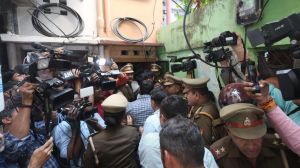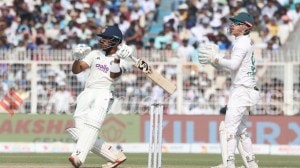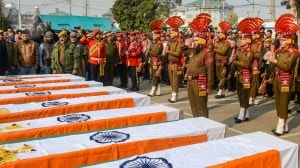Civic union fights "cold war"
SEPTEMBER 28:IT is neither Municipal Commissioner Girish Gokhale nor the rival unions, for over a lakh of agitating civic workers feel thei...

SEPTEMBER 28:IT is neither Municipal Commissioner Girish Gokhale nor the rival unions, for over a lakh of agitating civic workers feel their enemy is the Shiv Sena.
The ongoing offensive against the civic employees, organised under the Municipal Mazdoor Union (MMU), is reminiscent in style and magnitude of the 1984 textile strike which many observers describe as the Waterloo for the organised labour movement of Mumbai.
When the civic administration intends to derecognise the MMU, its leader Sharad Rao feels it is beginning of a cold war. "There will be no peace in the municipal corporation any more," said he.
"The traditional tiring game between the labour and the civic administration has begun, but we can’t afford to lose," he added. The civic administration’s show cause notice asking why the union should not be derecognised in view of illegal actions in the past, does not bother Rao much. "That piece of paper cannot stand the scrutiny of law," he is confident and will reply to it in due course.
None of the MMU-led agitation were declared illegal by courts in the past and the very foundation of the show cause notice is shaky, he felt.
"I sympathise with Gokhale. I know the kind of pressure he faces. Being an army man he is not used to taking orders but as a commissioner he is being ordered around by a remote control," Rao said.
Breaking a majority union is a task before the municipal commissioner, even though his stated intention is to save the BMC from financial ruin due to mounting wage bill.
He would show how the corporation would have very little to spend on the upkeep of the city if it met workers’ demands.
On the eve of the civic agitation, Gokhale had launched a massive public relation exercise explaining to the editors how irrational were the majority of civic employees. A commissioner personally visiting newspaper offices was an event that never happened before.
On the other hand, George Fernandes the leader of MMU affiliate, Hind Mazdoor Kisan Panchayat, was forced to spend time in Mumbai to intervene at the stage when it’s not too late.
The commissioner’s economic rationale could have generated a healthy debate on shaping up the corporation’s finances if his determined action was not seen as attempts to help the Shiv Sena union get a toe hold in the BMC. His economic concerns have been eclipsed by the hidden agenda of the ruling party.
The Sena’s earlier attempts to influence Mumbai’s labour scene were mainly based on regional chauvinistic sentiments of Maharashtrian workers. While such appeals brought occasional electoral success, it failed to build a significant following for its unions.
Despite its general political success, the Sena has failed to make much inroads in Mumbai’s trade unions which traditionally had a stronger class overtone. In the civic corporation MMU’s following is more than the combined strength of all other unions including the one led by Shiv Sena.
During the progressive decline of the organised trade union movement particularly after the textile strike, the Sena leadership had helped managements in disorganising workers, rather than organising them, inviting multiplicity of unions and bloody inter-union rivalry.
But short cuts are being tried. The morcha by the Sena union yesterday was an extremely poor show. But a photograph published in the Sena mouthpiece Saamna surprisingly shows a sizeable crowd.
If Rao is to be believed the photograph was taken during the MMU’s morcha. “Else why should there be an MMU flag in the photograph,” he asks adding that he will lodge a complaint against the paper before the press council. For the civic administration it is a fight to the finish.
The agitating union was more than once provoked to resort to strike which, if prolonged, could have paved the way for mass scale privatisation with all public sympathy while the collective bargaining power would have slid into the hands of the Sena union.
The MMU leadership, however, scuttled this plan for now by avoiding a seemingly imminent strike and opted for what Rao called a cold war’. The ensuing confrontation promises to be decisive for the organised labour in Mumbai.
The fight is shifting from streets to the courts. Instead of replying to the show cause notice the MMU today shot off a letter to the municipal commissioner reiterating its long pending demand for declaring all departments and establishments of the BMC as one undertaking as required under section 3(5) of the MRTU and PULP Act-1971. This is aimed at strengthening MMU’s position as the only recognised civic union.
There are a few departments where MMU does not have absolute majority and if those departments were treated separately the rival union could gain some toe hold.





- 01
- 02
- 03
- 04
- 05

























